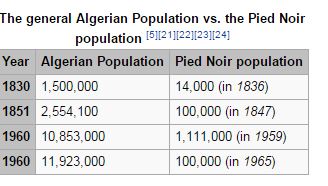One of the main differences between Algeria and other Maghreb countries controlled by France was the extensive settlements established there. European settlers began arriving immediately after the capture of Algeria in 1830.
These settlers were encouraged by the colonial policy which makes it easy for them to massively "buy" Algerian lands at the expense of the native population. Later a set of laws (Code de l'indigénat) was codified to create an inferior legal status for the natives and give even more special status to the colonists.
Anyway, in 1847 (slightly before the official annexation of Algeria in 1848), the settler population already reached 100,000, almost 5% of the total population. Later this reached around 10% of the total population, disproportionately holding a large part of the arable lands. The settler population was nowhere ever near this level in Morocco and Tunisia.

Table source: Wikipedia
As for why Algeria had more settler population than the other colonies, a possible simple reason (highlighted by Medi Saif in the comments of this answer) might be that it was the first to be controlled by France. Algeria was captured in 1830, while Tunisia was captured in 1881 and Morocco became a French protectorate only in 1912.
So, the initial settlement of Algeria by the Europeans encouraged higher degree of integration with France (including annexation) and favorable laws to French citizens, and in turn all these things encouraged even more settlement to Algeria. I hope this answer your question.
